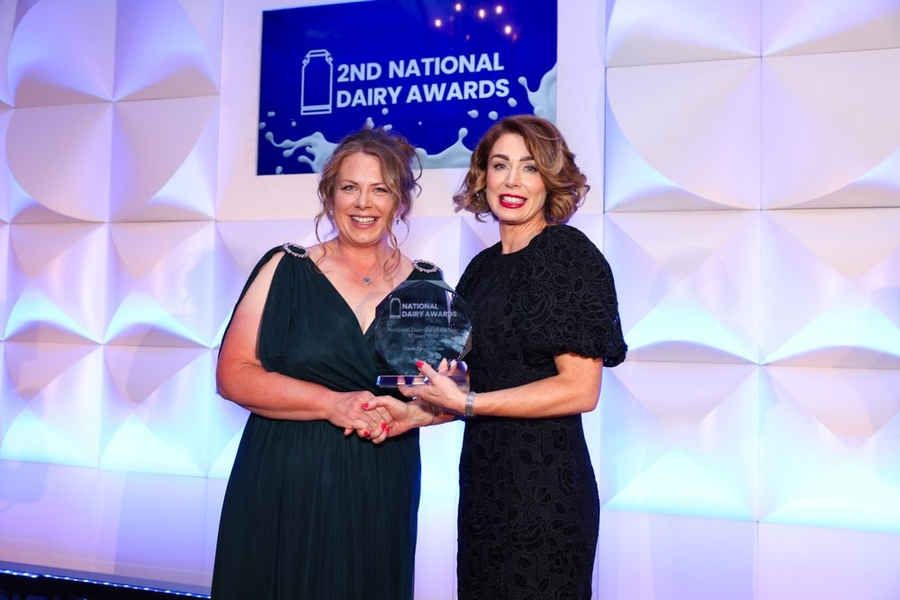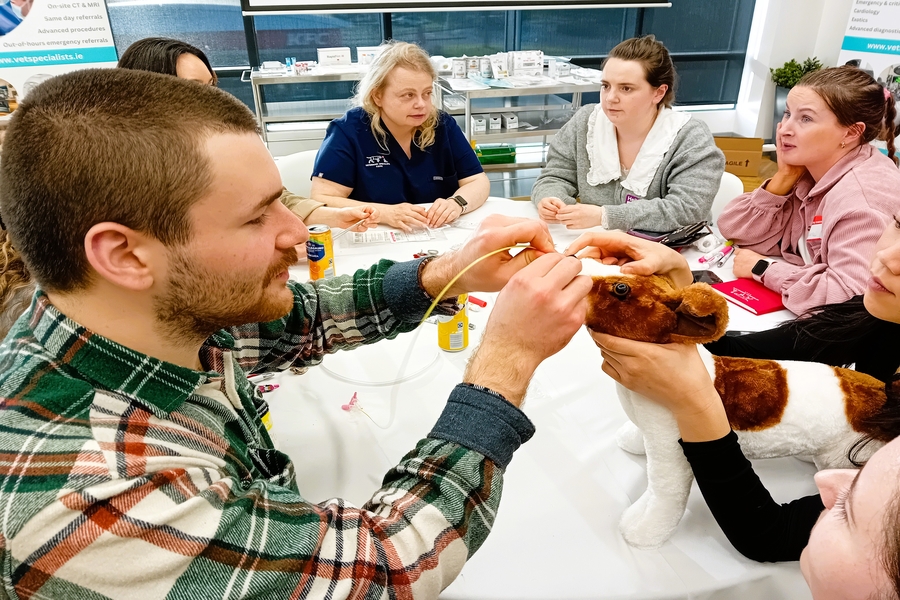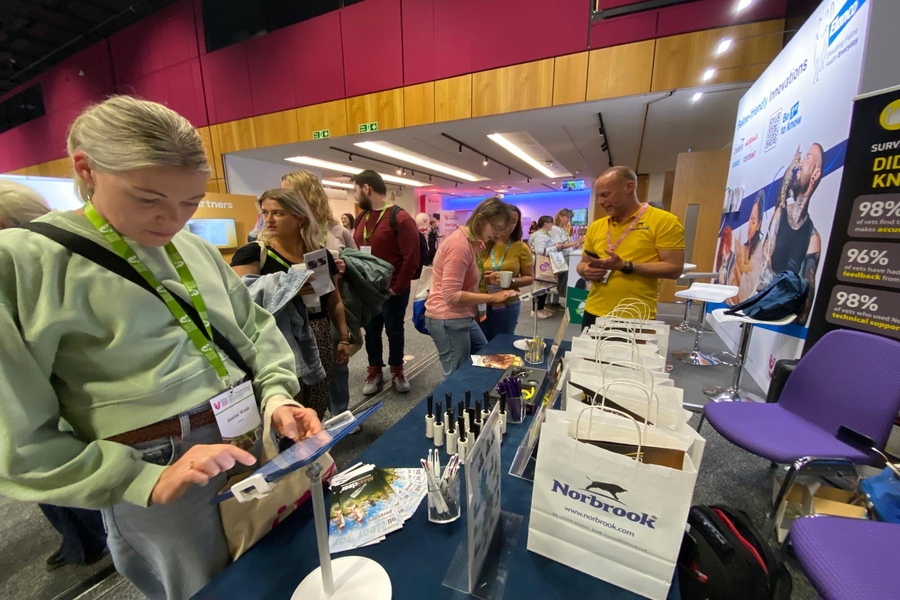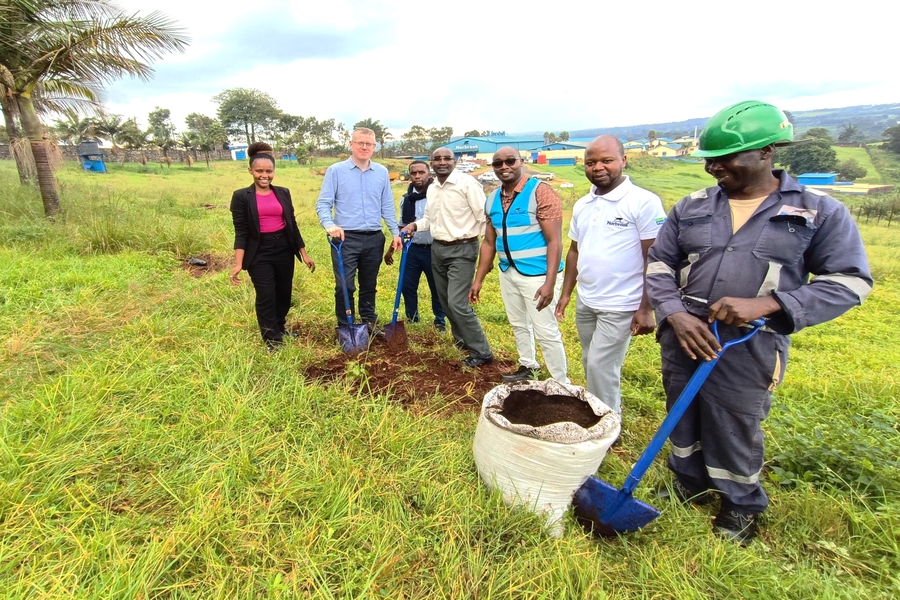Marie-Louise Ryan is the Irish Dairy Vet of the Year
Irish veterinarian, Marie-Louise Ryan, won the Norbrook sponsored, Dairy Vet of the Year at the prestigious National Dairy Awards in Ireland. Norbrook's Irish veterinary advisor, Maura Langan, presented Marie-Louise with the title at the award ceremony. Maura was delighted to speak with Marie-Louise recently to understand more about how she got into the profession and learn more about her daily job.
Maura: Congratulations on being awarded the Dairy Vet of the Year at the recent dairy awards. Why do you think the judges selected you as the winner?
Marie-Louise: I was very honoured to be nominated for the award and never thought I'd actually win it! I think my approach to veterinary is why I won. I like to build a trust with my clients, a lot of what I do is very dependent on the relationship I have with my clients. Being from a farm myself, I understand the challenges that my clients are facing and believe that we can work together to progress their herd. I take a holistic approach to veterinary, while I do a lot of clinical work, I feel its very important to review each year and see what can be done to improve things on the farm so that farms can be sustainable, reduce their environmental impact and become more efficient.
Maura: Tell us about your day job. What does a typical day look like for you?
Marie-Louise: I work as a vet in Mulcair vets in county Tipperary and our practice is part of XLVETs Ireland. A typical day in my week varies hugely depending on the time of year. Mulcair vets is predominately a dairy based practice so in spring it's all about calving cows and managing periparturient disease such as ketosis, milk fever, Left displaced abomasum's (LDA's), Right displaced abomasum's (RDA's) and mastitis. Calf health is also a bit part of spring work. We do a lot of knock down debudding in spring also.
As the spring progresses, my days become more routine and scheduled with a lot of pre-breeding scanning, body condition scoring pre breeding, bull fertility work and there is still a nice bit of clinical work thrown in. In summer and autumn, it's pregnancy scanning, herd health work such as body condition scoring, planning ahead to avoid repeat issues on farms that occurred during the spring, teat sealing heifers and dry off planning through the use of milk recordings and milk culture and sensitivity.
Maura: What do you enjoy most about being a vet?
Marie-Louise: There isn't just one thing that I enjoy most, it's a combination of things. It's such a rewarding profession, I tend to get very invested in helping my clients progress their herds. I love to see them making progress, if it's increasing their 6 week calving rate, reducing their empty rate, improving their somatic cell count or reducing the incidence of disease. A veterinary career allows you to build relationships and great friendships with people, the day to day variation makes sure you never get bored.
Maura: Did you have a dream job when you were a child and why that job?
Marie-Louise: I have always wanted to be a vet, I love working with animals especially cattle. Having grown up on a farm, I've been around cattle all my life so it's great that I get to work with them every day now.
Maura: What inspired you to become a vet?
Marie-Louise: My first memory of wanting to become a vet was when I was watching a C-section sitting on a square bale as a 7 or 8 year old, I was fascinated at how systematic the surgical process was and how resilient the cow and calf were after such a quick entry into the world. Over the years I had lots of interaction with vets calling to our own farm and always thought that it was something I'd like to do.
Maura: What have been the main changes that you've seen in the industry in the years since you've qualified?
Marie-Louise: I graduated in 2015 which coincided with the abolition of dairy quotas in the European Union, so there has been a massive expansion in the dairy industry, so farms have definitely increased in cow numbers. The move towards prudent antibiotic use and selective dry cow therapy has also gained momentum massively since I qualified. Farmers have become much more focused on sustainability, improving efficiency and reducing their environmental impact in recent times.
Maura: What would you say to people considering studying to become a vet and entering the industry?
Marie-Louise: If veterinary is something that you are considering, then you should go for it. Veterinary is a very rewarding profession. It is important to consider the level of commitment it involves in getting into veterinary school and qualifying as a vet. While there are long hours and some bad days, the good days are great and more than make up for the tougher days. I love what I do and I wouldn't change it for the world.
My own experience of becoming a vet was not the most direct. Having missed a college course in veterinary by 5 points after I finished school, I took up my second choice which was Economics & Finance in University College Dublin. I knew very quickly that it wasn't for me but I completed the degree which unfortunately coincided with the financial crash. I then when back and repeated my final year exam in school at 21 years old and got the points for veterinary in University College Dublin and the rest is history.









